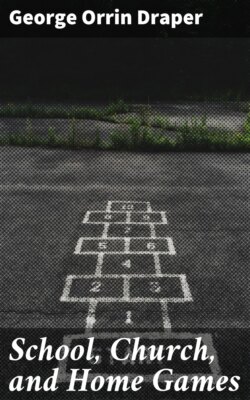Читать книгу School, Church, and Home Games - George Orrin Draper - Страница 3
На сайте Литреса книга снята с продажи.
FOREWORD
ОглавлениеTable of Contents
We should all be prospectors of happiness. There are those who discover it in the solitudes of the mountains where freedom is breathed in the air that touches the lofty peaks. Others find it in the depths of the forest in the songs of the birds, of the brook, of the trees. Most of us must find it in the daily walks of life where the seeking is oft-times difficult. Nevertheless, there it is in the manufactured glory of the city, in the voices of children, and in the hearts and faces of men.
Happiness becomes a habit with some; with others it is a lost art. Some radiate it; others dispel that which may exist. Happiness can be produced by means of exercising certain emotions, by causing experiences which allow instinctive expression; the song, the dance, the game are examples.
All enjoyed activity may be classified as play.
Play is that which we do when free to do as we like.
Play produces happiness.
Work is the highest form of play. The great artist is playing when his imagination finds expression on the canvas in color. If he did not love to paint he would never have become a great artist. The engineer is playing when he produces the great bridge; the financier when he masterfully organizes his capital.
The imagination of the child leads him into all kinds of adventure. He becomes the engineer on the locomotive; he becomes the leader of the circus band; he is a great hunter of terrible beasts; an Indian, a cowboy, and a robber. In fact, he tries his hand at all those careers which interest him, and we call it play, or may even call it nonsense. In fact, some think play is but nonsense.
Play is the expression, the exercising of the imagination. Should the child be denied the privilege of play, should its visions never find expression, should its mental adventures fail to find adequate physical experience, a great musician, a great engineer, a great statesman, or a master of some great art may be sacrificed.
Play is not only essential to the child, but, as Joseph Lee says, play is the child. The natural environment of the child is a play environment; if we are to lead the child or educate the child we have first to enter into his environment and into fellowship with him therein, and adapt our methods to that environment. The processes of education which have taken to themselves those things which are natural to children will meet deserved success. The schoolroom, the Sunday school room, or home in which a play atmosphere is experienced, small though this experience may be, is operating on a sound basis. Play is nature's method of education. As a kitten in chasing the leaves in the road is playing, it is also learning to catch the bird or the mouse essential for the maintenance of life. So the child, by nature, learns to live by play.
Activity is life. Directed activity means directed life. The body is but the means of activity and is developed only in accord with the activity demands of the individual. Character is but the trend of the activities of an individual. So the activities are more the individual than is the flesh and bone which we see.
If we recognize that in play the child is under the tutorship of nature, we should seek to encourage rather than discourage the process. By directing the play we are training for life—yes, more, we are creating life.
As play creates in the child, it re-creates in the adult. Activity is essential to growth. Having attained physical growth, the adult does not demand as much physical activity as does the child and as years increase the tendency toward physical activity decreases. There is real danger in this becoming too meager to maintain efficiency, and we recognize more and more the necessity for vacation periods when some of the old spirit of play or of joyful activity may be indulged in and a re-creation process be set up. This recreation is simply reawakened activity, making for greater abundance of life.
The spirit of play and the spirit of youth travel hand in hand. If we allow the spirit of play to depart from our life, we lose our grip upon life itself. Every man and woman should cultivate and vigorously maintain a play spirit. This might be done through some hobbies, games, or art into which they can throw themselves with abandon for periods of time, frequent, if brief. They should thoroughly enjoy the experience. For the wealthy, to whom all things are possible, this may be hard to find. To those of limited means and of little free time, opportunity is more abundant. To them joy shines forth from even the so-called commonplace things of life.
The joy on the faces of those who are playing games, the merry laughter, the jest, the shouting, place this type of activity on a pinnacle among those producing happiness.
This volume has been prepared, in order that the young and old may find greater opportunity for joyful activity, and experience the good fellowship, the kindly feeling, the exhilaration and life resulting from playing games, and that those fundamental agencies of civilization, the Church, the school, and the home, may be better equipped to serve mankind and to add to the sum of human happiness.
